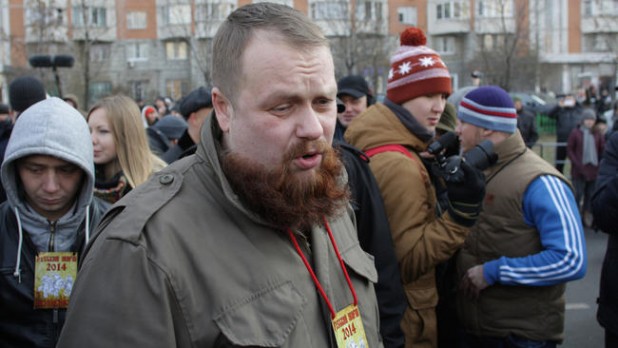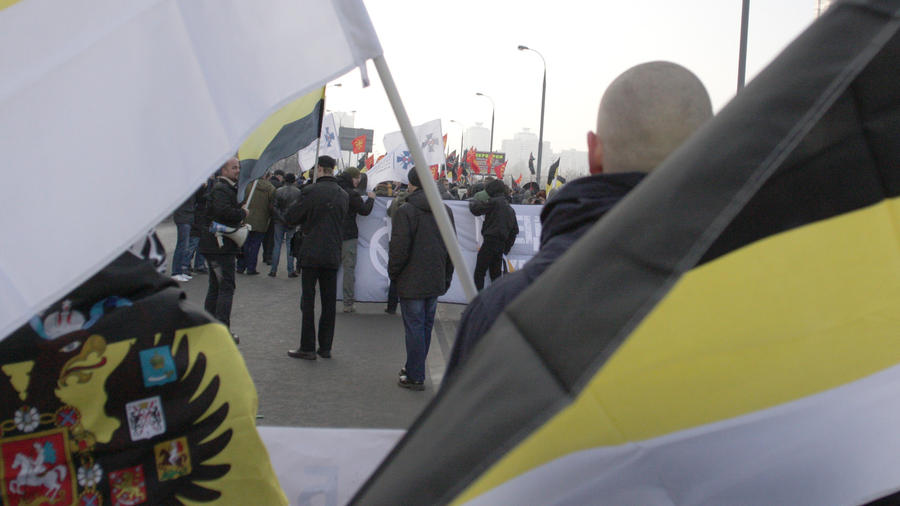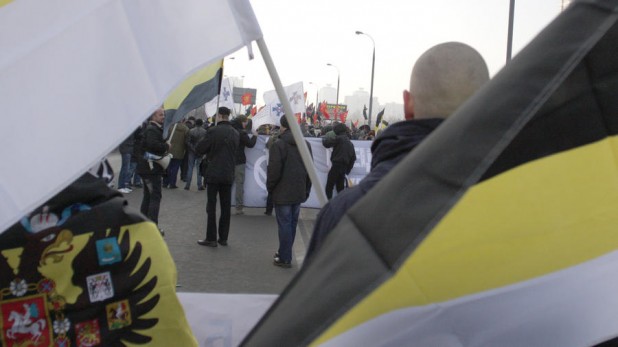Daily Stormer
August 23, 2015
Naughty, naughty Russians.
The protesters, several thousand strong and surrounded by hundreds of armed police, chanted nationalist slogans and racial slurs, occasionally raising their right hands in a Nazi salute.
It was the 10th annual gathering of white supremacists, neo-Nazis and far-right nationalists, held in Moscow in November.
“Nationalism has a bright future in Russia,” said co-organizer Dmitri Demushkin, 36, a former skinhead and ex-leader of the Slavic Union, a banned group whose Russian initials, SS, intentionally mimic those of the Nazi paramilitaries. “We will either win or the Russian people will die.”
The very existence of homebred neo-Nazis and racists, made graphically clear each year in what is known as the Russian March, is still shocking to many in Russia, a multiethnic country that once professed to be building an internationalist, communist utopia and still prides itself on the victory over Nazi Germany in World War II.
la-fg-russia-neo-naziDmitri Demushkin is one of the organizers of the Russian March, the annual showdown of white supremacists, neo-Nazis and far-right nationalists held in Moscow and Russia’s largest cities in early November. (Mansur Mirovalev / For The Times)
Yet Russia’s far right isn’t limited to a few marginal figures. It is a vortex of militant gangs, movements and political parties that enlist tens of thousands of members who are also among those most loudly applauding President Vladimir Putin and his strong-arm policies against Ukraine and other former Soviet republics.
…
But even as the Kremlin sought to rein in the violent right, it also incorporated elements of the nationalist agenda as part of its anti-Western and isolationist ideology that praises the “unique Russian civilization” devoid of “decadent” liberalism.
Officially tolerated expressions of racism such as the Russian March have nurtured the growing xenophobia and intolerance gripping Russia today. Some 54% of Russians support the idea of “Russia for ethnic Russians,” and more than a third would welcome the expulsion of Caucasus and Central Asian Muslims, according to the latest poll on the matter, a July 2014 survey by the independent Levada Center.
“The current government partially declares the imperial slogans we declared almost 25 years ago,” said Eduard Limonov, a novelist and leader of the now-banned National Bolshevik party.
…
The conservative and immensely powerful Russian Orthodox Church, resurgent czarist-era paramilitary Cossacks, and right-wing parties represent the largest players in the field of official, Kremlin-sanctioned nationalism.
Its superstar is Vladimir Zhirinovsky, a veteran politician who served as a deputy speaker of the State Duma, Russia’s lower house of parliament, and heads the LDPR party that holds 56 of the 450 Duma seats.
The flamboyant 69-year-old ran for president five times, campaigning on promises to expel non-Russians, install barbed wire around Chechnya and Dagestan, Russia’s violence-plagued Muslim provinces, and “return” Ukraine, Belarus and the Baltic states to the Russian empire.
But his pledges and party are widely seen as pseudo-opposition, a Kremlin tool to “sterilize nationalist voices,” says Andrey Kolesnikov, a political analyst with the Moscow Carnegie Center think tank.
“Just because the state wants to preserve its monopoly on nationalism — and this is one of the most important political aims because such ideology is popular and it, among other [factors], keeps Putin’s ratings high — it responds very harshly to any manifestations of nationalist extremism,” Kolesnikov said.
The two sides of Russian nationalism — banned and co-opted — often converge.
Half a dozen pro-Kremlin youth movements emerged after the 2005 pro-West “Orange Revolution” in Ukraine. Created to counter opposition street rallies in Russia, they recruited racist soccer fans and ultranationalists and used their slogans, according to rights groups, anti-Nazi bloggers and Russian media.
The founder of a brutal neo-Nazi gang recently claimed to have “cooperated” with two such groups.


